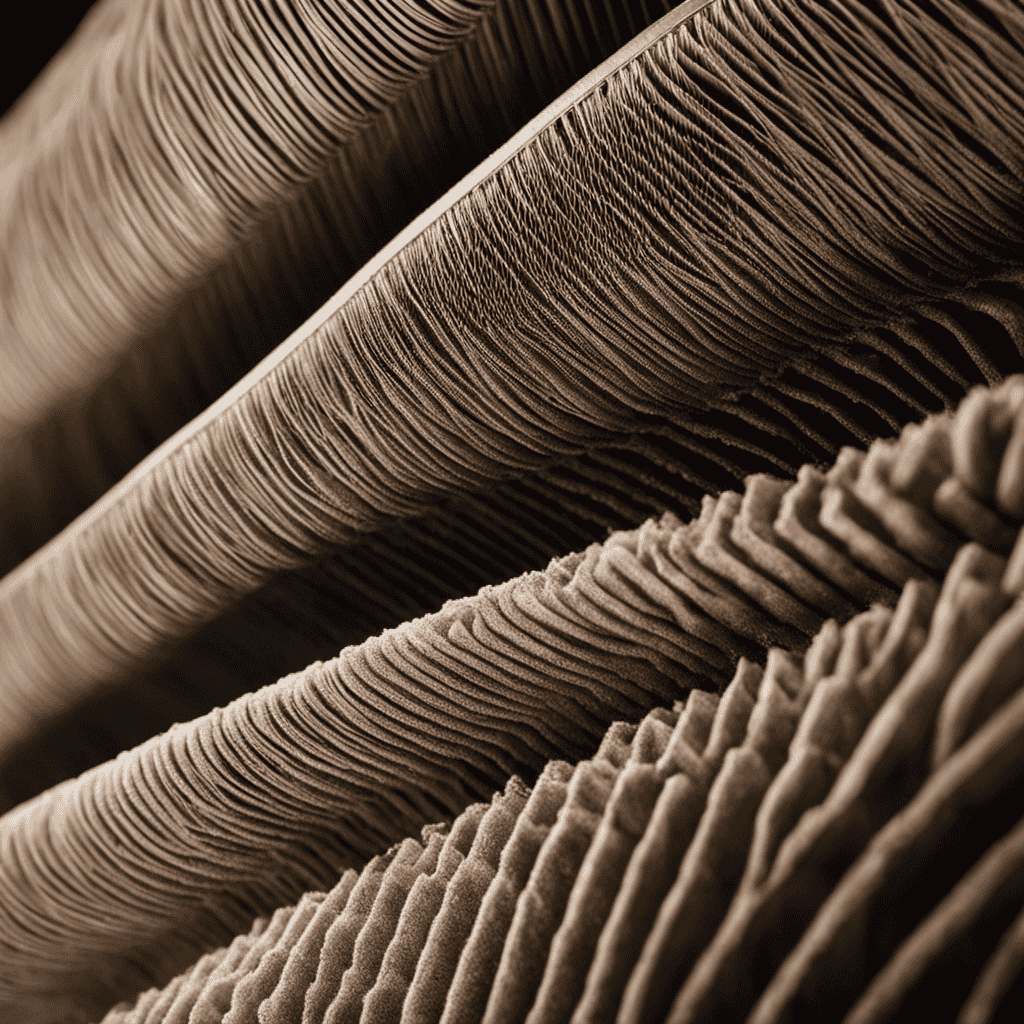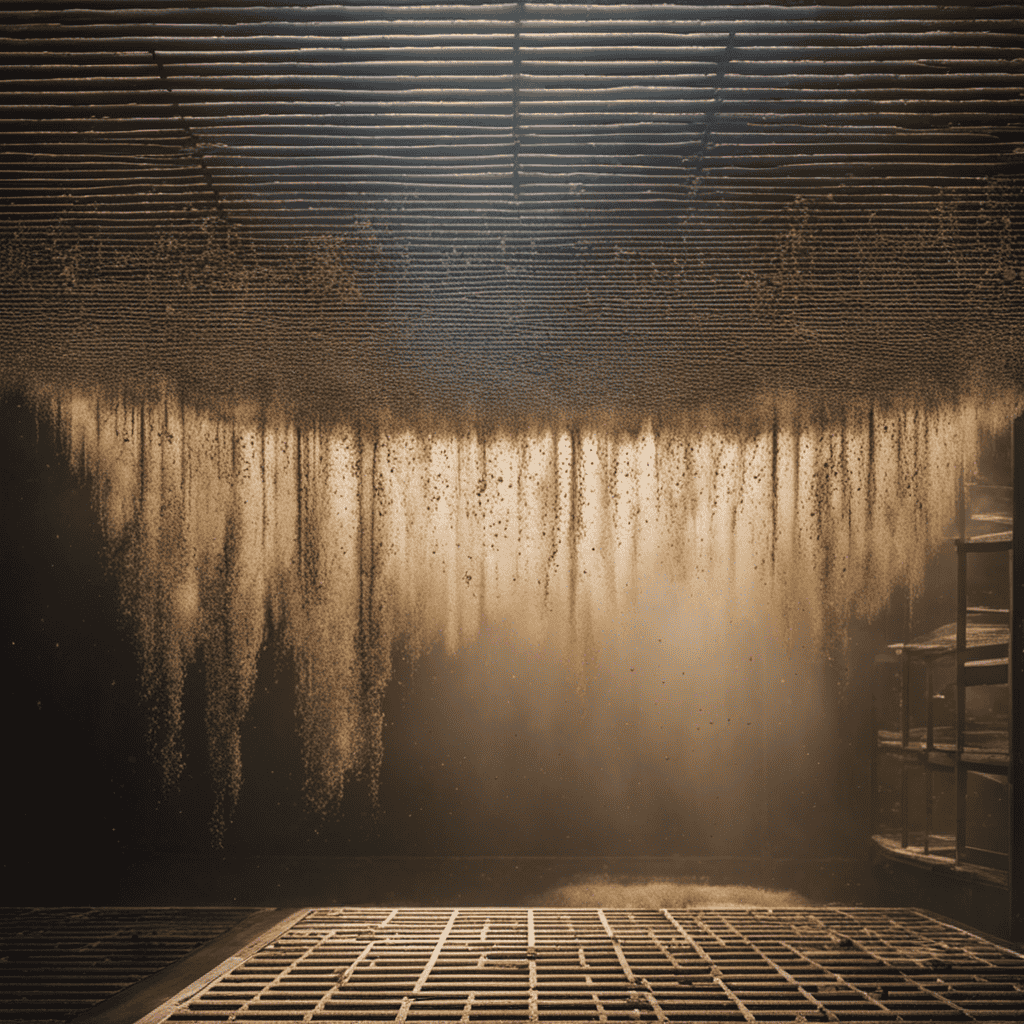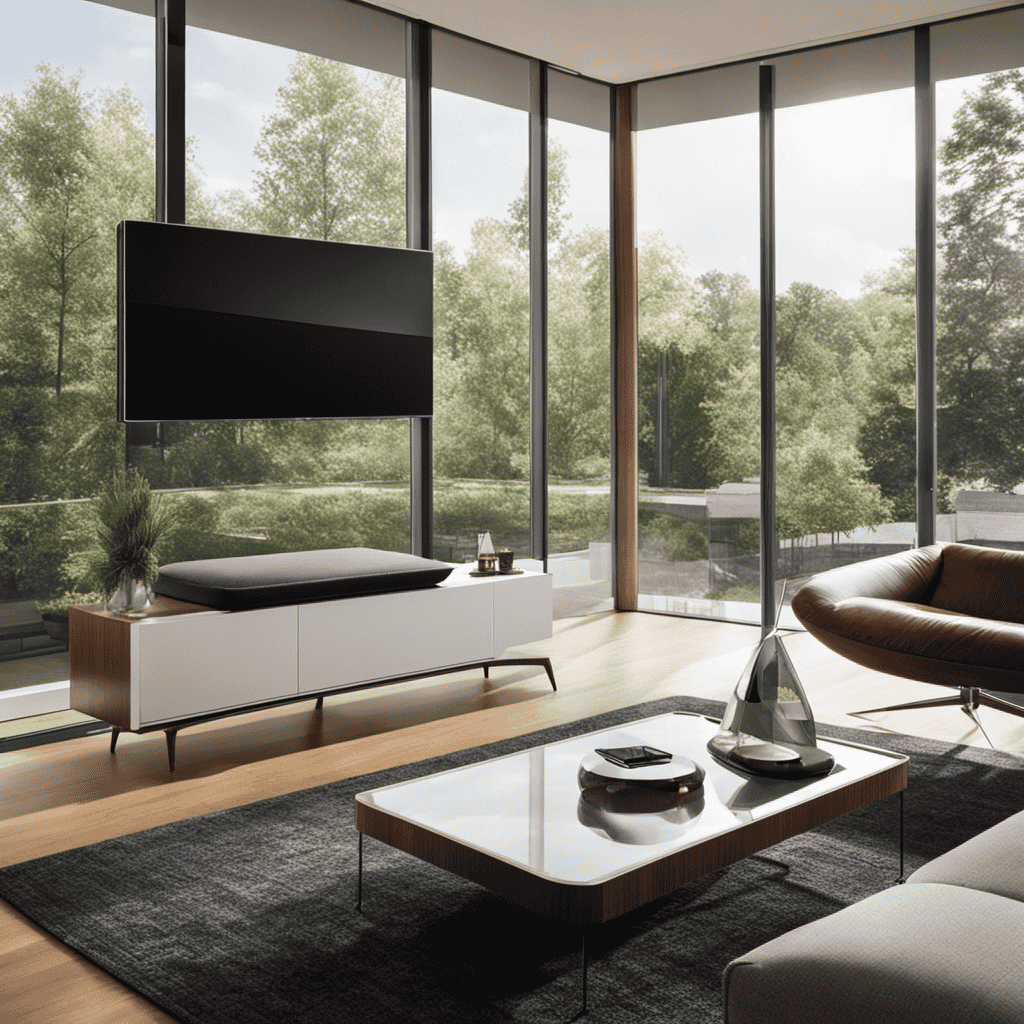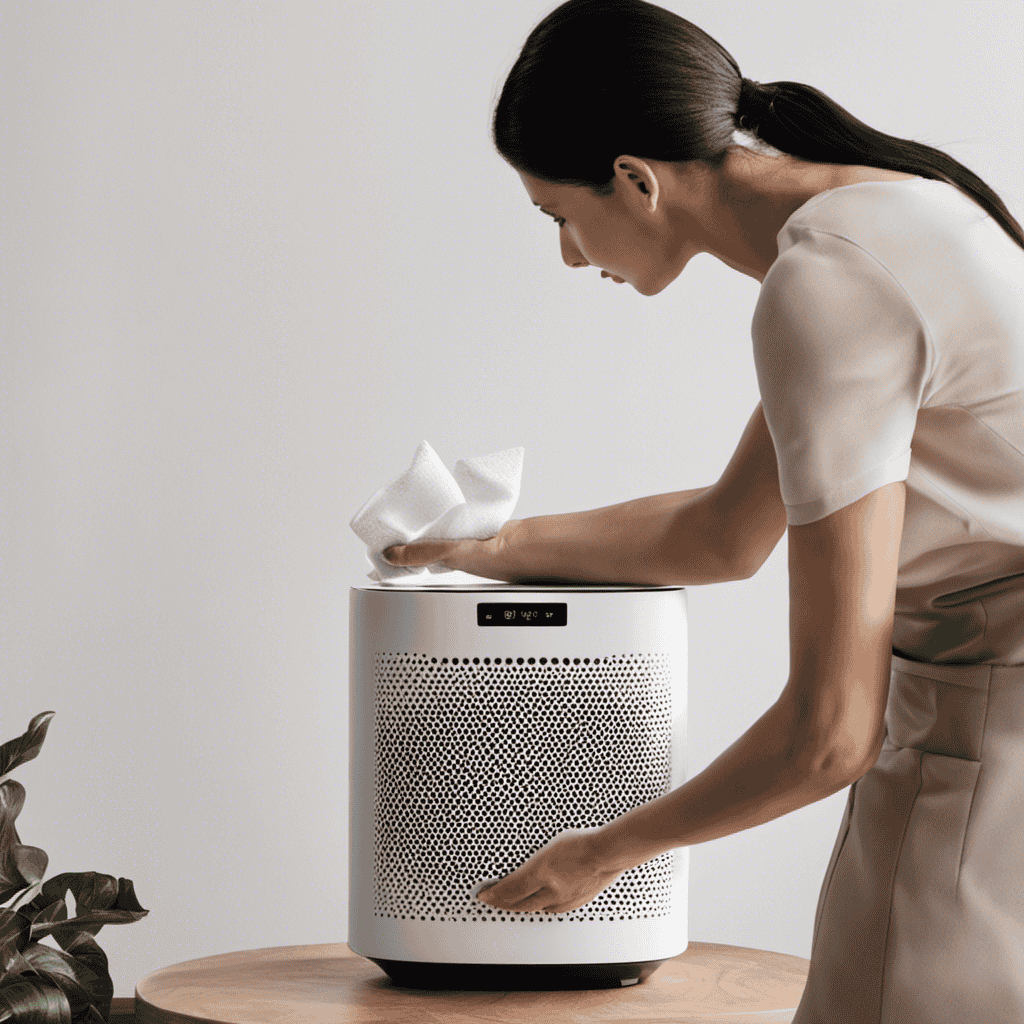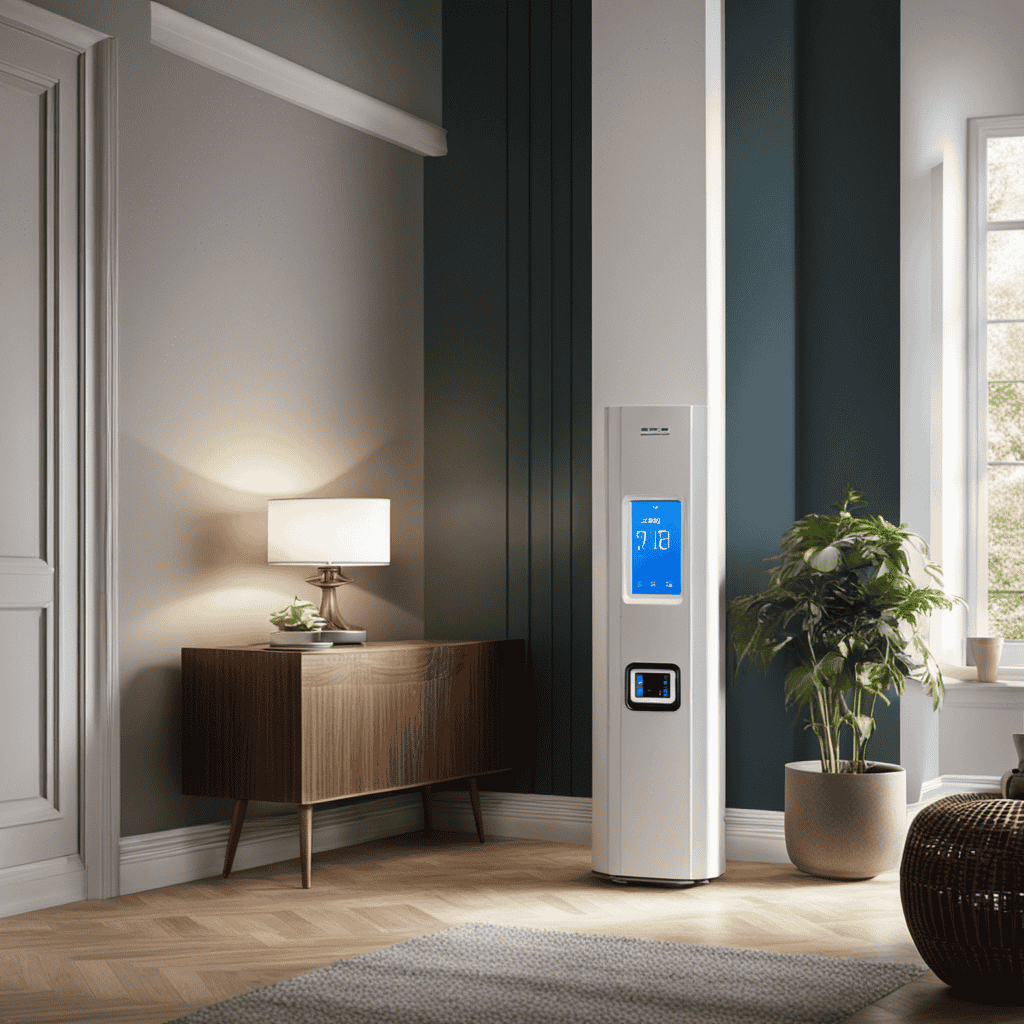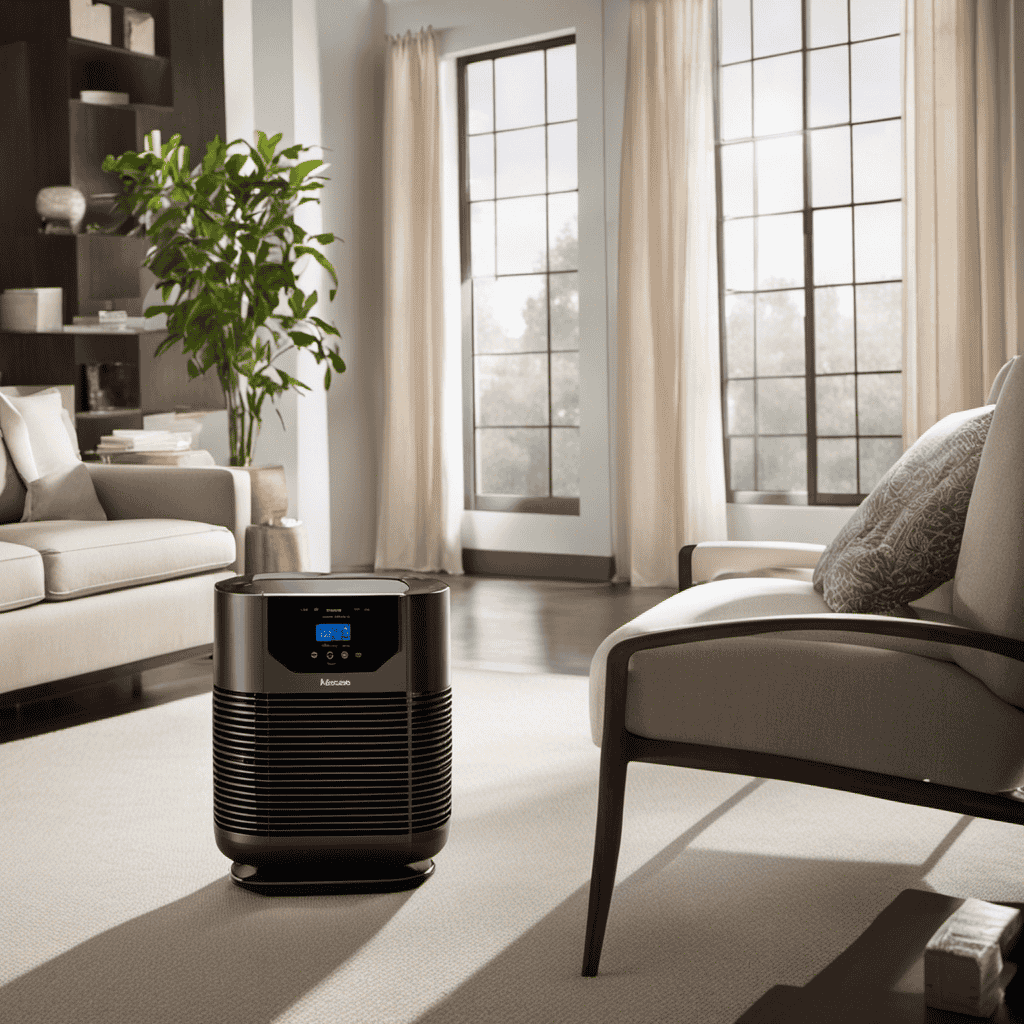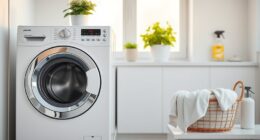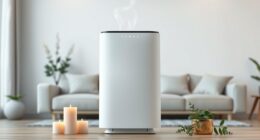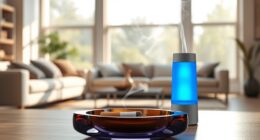As someone who uses air purifiers regularly, I often question: How frequently should I change the filter?
In this article, I will delve into the factors that affect the lifespan of air purifier filters and provide you with recommended frequencies for replacement.
By understanding the signs that indicate a filter needs to be replaced and learning how to extend its lifespan, you can ensure cleaner and healthier air in your home.
So, let’s dive in and explore the world of air purifier filter maintenance together.
Key Takeaways
- The optimal replacement frequency for air purifier filters is typically every three to six months.
- Factors that affect the replacement frequency include air pollution levels, room size, and the presence of pets or smokers.
- Signs that indicate the need for filter replacement include reduced airflow, strong odors coming from the purifier, and clogged filters due to dust and other particles.
- To extend the lifespan of air purifier filters, it is important to regularly replace them, avoid washing or vacuuming the filter, invest in high-quality filters, and follow the manufacturer’s guidelines for replacement frequency and cleaning methods.
Factors Affecting Air Purifier Filter Lifespan
There are several factors that can affect the lifespan of an air purifier filter.
One of the most important factors is the recommended replacement frequency. Manufacturers typically provide guidelines on how often the filter should be replaced to maintain optimal performance. These guidelines are based on the filter’s capacity to trap particles and the average air quality in the environment.
Another factor to consider is the signs of filter degradation. Over time, filters can become clogged with dust, dirt, and other pollutants, reducing their effectiveness. Signs of degradation include decreased airflow, a noticeable increase in dust in the room, and a decrease in the filter’s ability to remove odors.
Regular maintenance and cleaning can help prolong the filter’s lifespan, but eventually, replacement will be necessary to ensure clean and healthy air in your home.
Recommended Frequency for Air Purifier Filter Replacement
When it comes to ensuring clean and healthy indoor air, understanding the optimal frequency for air purifier filter replacement is crucial.
There are various factors that can affect the replacement frequency, such as the type of air purifier, the environment in which it is used, and the level of pollutants present.
In this discussion, we will delve into these key points and explore the research surrounding them to determine the best practices for maintaining effective air purification.
Optimal Filter Replacement Frequency
The optimal frequency for replacing an air purifier filter is typically every three to six months. Regular filter replacement is crucial to maintain the efficiency of the air purifier and ensure clean and healthy air in your home. There are several factors that can affect the efficiency of the air purifier filter, including the level of air pollution in your area, the size of the room, and the presence of pets or smokers. It’s important to consider these factors when determining the replacement frequency. Additionally, choosing cost-effective filter replacement options can help save you money in the long run. Here is a table outlining some popular filter options and their prices:
| Filter Type | Price |
|---|---|
| HEPA Filter | $20-50 |
| Carbon Filter | $15-30 |
| Washable Filter | $10-20 |
| Electrostatic Filter | $15-40 |
| UV-C Filter | $25-60 |
Considering these factors and cost-effective options can help you make an informed decision about when and how to replace your air purifier filter.
Factors Affecting Replacement Frequency
Factors such as air pollution levels, room size, and the presence of pets or smokers can impact how frequently you should replace your air purifier filter. These factors play a crucial role in determining the lifespan of your filter and the cost of replacement.
High levels of air pollution can clog your filter faster, leading to more frequent replacements. This can be frustrating and costly.
Room size also matters. Larger rooms may require more powerful air purifiers with larger filters, which may need to be replaced more often.
The presence of pets or smokers in your home can introduce additional contaminants into the air, causing your filter to work harder and potentially reducing its lifespan.
Understanding these factors is essential for maintaining clean and healthy air in your home. By considering the impact of air quality on your filter lifespan, you can make informed decisions about when to replace your air purifier filter and minimize the associated costs.
Signs That Your Air Purifier Filter Needs to Be Replaced
If you notice reduced airflow or a strong odor coming from your air purifier, it’s time to replace the filter. Filters can become clogged with dust, pet dander, pollen, and other particles, reducing their effectiveness over time. One of the factors affecting filter efficiency is the type and amount of pollutants in the air. Another factor is the frequency of use and the size of the room. If you use your air purifier in a large room or run it continuously, the filter may become clogged more quickly.
Signs of a clogged filter include decreased airflow, a noticeable increase in dust settling on surfaces, and a musty smell coming from the purifier. Regularly checking and replacing the filter is crucial to maintain the efficiency and effectiveness of your air purifier.
How to Extend the Lifespan of Your Air Purifier Filter
Taking proper care of your air purifier filter is essential for maintaining its effectiveness and extending its lifespan.
In order to achieve this, it is crucial to learn about the proper maintenance techniques and effective cleaning methods.
Proper Maintenance Techniques
One important aspect of properly maintaining your air purifier is regularly replacing the filter. Many people underestimate the importance of this task and neglect it, leading to reduced efficiency and compromised air quality.
To ensure effective cleaning and optimal performance of your air purifier, here are some effective cleaning techniques to keep in mind:
- Regularly check the filter for dirt and debris buildup.
- Follow the manufacturer’s guidelines for filter replacement frequency.
- Avoid common misconceptions such as washing or vacuuming the filter, as this can damage its filtering capabilities.
- Consider investing in a high-quality filter to improve air purification efficiency.
Effective Cleaning Methods
To effectively clean your air purifier, make sure to regularly check for dirt and debris buildup on the filter and follow the manufacturer’s guidelines for replacement frequency.
Effectively cleaning your air purifier is crucial in maintaining its performance and ensuring that it continues to provide clean and healthy air. One of the most important cleaning methods is to regularly check the filter for any dirt or debris accumulation. This can be done by visually inspecting the filter and gently tapping it to dislodge any trapped particles.
Additionally, using a vacuum cleaner with a brush attachment can help remove any stubborn dirt or dust. It is also important to follow the manufacturer’s guidelines for replacement frequency, as this will ensure that the filter is working optimally and providing the best air purification results.
Proper maintenance techniques include regular cleaning and replacement of filters, as well as keeping the air purifier in a clean and dust-free environment. By following these effective cleaning methods and proper maintenance techniques, you can ensure that your air purifier continues to function efficiently and provide clean and fresh air for you and your family.
Understanding Different Types of Air Purifier Filters
Do you know the different types of air purifier filters and how they can improve the air quality in your home?
Air purifier filters play a crucial role in maintaining clean and healthy indoor air. Here are some types of filters commonly used in air purifiers:
-
HEPA (High-Efficiency Particulate Air) filters: These filters are highly effective in removing allergens, dust, pollen, and pet dander from the air.
-
Carbon filters: These filters are excellent at removing odors, chemicals, and gases from the air.
-
UV filters: These filters use ultraviolet light to kill bacteria, viruses, and other microorganisms in the air.
-
Electrostatic filters: These filters use an electric charge to attract and trap airborne particles.
Understanding the different types of filters allows you to choose the most suitable one for your specific needs. Regular maintenance of these filters is essential to ensure their optimum performance in capturing and eliminating various types of air pollutants.
The Importance of Regular Air Purifier Filter Maintenance
When it comes to maintaining an air purifier, two key points to consider are the filter lifespan and effectiveness, as well as the health benefits that come with regular maintenance.
Understanding how long a filter lasts and when it needs to be replaced is crucial in ensuring that the air purifier continues to effectively clean the air.
Additionally, regular maintenance such as cleaning and replacing the filter can improve the overall health benefits of using an air purifier, as it ensures that the device is working at its optimal level.
Filter Lifespan and Effectiveness
You should regularly check the lifespan and effectiveness of your air purifier filter. Proper maintenance of your air purifier filter is crucial to ensure its optimum performance in improving indoor air quality.
There are several factors that can affect the effectiveness of your filter, including the type of pollutants in your environment, the size of your room, and the frequency of filter usage.
Signs of a clogged air purifier filter include reduced airflow, increased noise level, and a decrease in the air purifier’s ability to remove contaminants.
Regularly inspecting and changing your air purifier filter can help prevent these issues and ensure that your air purifier is functioning at its best.
Don’t overlook the importance of filter lifespan and effectiveness in maintaining clean and healthy indoor air.
Health Benefits of Maintenance
Regular maintenance of your air purifier filter ensures that you can enjoy the health benefits it provides. Proper filter maintenance is crucial in maintaining the effectiveness of your air purifier and ensuring that it continues to remove pollutants from the air. The frequency of filter replacement depends on various factors such as the type of filter, the quality of air in your environment, and the manufacturer’s recommendations. To help you understand the recommended filter replacement frequency, here is a table:
| Type of Filter | Recommended Replacement Frequency |
|---|---|
| HEPA | Every 6-12 months |
| Carbon | Every 3-6 months |
| Pre-filter | Every 1-3 months |
| Electrostatic | Every 1-3 months |
| UV-C | Every 6-12 months |
Benefits of Timely Air Purifier Filter Replacement
Replacing your air purifier filter on time has several benefits. Regularly changing your air purifier filter ensures that you and your family breathe in clean air, free from harmful pollutants. Here are some key advantages of timely air purifier filter replacement:
- Improved Indoor Air Quality: Clean air promotes better health, reduces allergies, and enhances overall well-being.
- Increased Efficiency: A clean filter allows your air purifier to work at its optimal level, effectively removing pollutants from the air.
- Longevity of Your Air Purifier: Regular filter replacement helps prolong the lifespan of your air purifier, saving you money in the long run.
- Reduced Environmental Impact: By maintaining your air purifier and replacing filters, you contribute to reducing air pollution and its negative effects on the environment.
Ensuring timely filter replacement is just one aspect of proper air purifier maintenance. Now, let’s explore common mistakes to avoid when replacing air purifier filters.
Common Mistakes to Avoid When Replacing Air Purifier Filters
One common mistake to avoid when changing air purifier filters is neglecting to check the manufacturer’s recommendations. Many people assume that all air purifiers have the same filter replacement schedule, but this is a common misconception. Different air purifiers have different filter lifespans based on factors such as the size of the unit, the quality of the filter, and the air quality in your home. To emphasize this point, here is a table showcasing the recommended filter replacement frequencies for three popular air purifier brands:
| Brand | Filter Type | Recommended Replacement Frequency |
|---|---|---|
| Brand A | HEPA filter | Every 6-12 months |
| Brand B | Carbon filter | Every 3-6 months |
| Brand C | Pre-filter | Every 1-3 months |
How to Choose the Right Replacement Filter for Your Air Purifier
To ensure your air purifier functions effectively, it’s important to select the correct replacement filter. When choosing filters for your air purifier, it’s crucial to compare filter options to find the one that best suits your needs.
Here are some key factors to consider:
- Filter efficiency: Look for filters with high-efficiency ratings to effectively capture airborne particles and pollutants.
- Filter lifespan: Consider the lifespan of the filter and how often it needs to be replaced to maintain optimal performance.
- Filter type: Different air purifiers require different filter types, such as HEPA filters for allergens or activated carbon filters for odors.
- Filter cost: Compare the cost of different filters and consider your budget while ensuring you’re getting good value for your money.
Expert Tips for Prolonging the Life of Your Air Purifier Filter
By implementing these expert tips, you can significantly extend the lifespan of your air purifier’s filter. Prolonging filter life and increasing filter efficiency are important factors in maintaining a clean and healthy indoor environment.
One tip is to regularly clean the pre-filter, which helps to trap larger particles and prolong the life of the main filter.
Another tip is to vacuum the filter regularly to remove any accumulated dust and debris.
Additionally, placing your air purifier in a strategic location, away from walls and furniture, can improve airflow and reduce strain on the filter.
Finally, replacing the filter at the recommended intervals is crucial for optimal performance.
Following these tips will not only save you money on filter replacements but also ensure that your air purifier continues to provide clean and fresh air for a longer period of time.
How Often Should I Replace My Air Purifier Filter?
The air purifier filter replacement frequency depends on usage and environment. For average use, it’s recommended to replace the filter every 6-12 months. However, if you have pets or allergies, consider replacing it every 3-6 months for optimal air quality.
Frequently Asked Questions
Can I Clean and Reuse My Air Purifier Filter Instead of Replacing It?
I don’t recommend cleaning and reusing air purifier filters. Regularly replacing them ensures optimal performance and removes contaminants effectively. Clean filters provide better air quality, reducing allergies and respiratory issues.
How Do I Know if My Air Purifier Filter Is Working Effectively?
To ensure my air purifier filter is working effectively, I regularly check its lifespan, as they typically last 6-12 months. Additionally, I improve efficiency by following manufacturer instructions and keeping the surrounding environment clean.
Is It Necessary to Replace the Pre-Filter Along With the Main Filter?
Replacing the pre-filter along with the main filter is important for optimal air purification. Using a different brand of pre-filter may affect the performance of the air purifier and could potentially reduce its effectiveness.
Can I Use a Generic or Third-Party Replacement Filter for My Air Purifier?
I have thoroughly researched the replacement filter options for air purifiers. While generic or third-party filters may be cheaper, I highly recommend using original manufacturer filters for optimal performance and maximum benefits.
Are There Any Specific Maintenance Steps I Should Follow to Ensure Optimal Performance of My Air Purifier Filter?
To ensure optimal performance of my air purifier filter, I follow specific maintenance steps. I regularly check for signs of a dirty filter, such as reduced airflow or a musty odor. Cleaning or replacing the filter extends its lifespan.
Conclusion
In conclusion, my research has shown that knowing when to replace your air purifier filter is crucial for maintaining clean and healthy air in your home.
By understanding the factors that affect filter lifespan and the signs that indicate replacement is needed, you can ensure optimal performance.
Additionally, by following expert tips and avoiding common mistakes, you can extend the lifespan of your filter and save money in the long run.
So, don’t neglect your air purifier filter – stay proactive and breathe easy!
